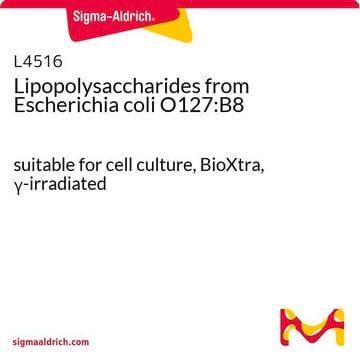G1639
D-(+)-Galactosamine hydrochloride
BioReagent, suitable for cell culture
Synonym(s):
2-Amino-2-deoxy-D-galactopyranose hydrochloride, D-Chondrosamine hydrochloride
About This Item
Recommended Products
biological source
fish cartilage (shark)
product line
BioReagent
Assay
≥99%
technique(s)
cell culture | mammalian: suitable
impurities
Glucosamine, essentially free
solubility
water: 50 mg/mL, clear to very slightly hazy, colorless to very faintly yellow
shipped in
ambient
storage temp.
room temp
SMILES string
Cl.N[C@@H](C=O)[C@@H](O)[C@@H](O)[C@H](O)CO
InChI
1S/C6H13NO5.ClH/c7-3(1-8)5(11)6(12)4(10)2-9;/h1,3-6,9-12H,2,7H2;1H/t3-,4+,5+,6-;/m0./s1
InChI key
CBOJBBMQJBVCMW-NQZVPSPJSA-N
Looking for similar products? Visit Product Comparison Guide
Application
- induce livery injury
- inflammatory liver injury
- acute liver failure (ALF) in mice
Biochem/physiol Actions
Storage Class Code
11 - Combustible Solids
WGK
WGK 3
Flash Point(F)
Not applicable
Flash Point(C)
Not applicable
Personal Protective Equipment
Certificates of Analysis (COA)
Search for Certificates of Analysis (COA) by entering the products Lot/Batch Number. Lot and Batch Numbers can be found on a product’s label following the words ‘Lot’ or ‘Batch’.
Already Own This Product?
Find documentation for the products that you have recently purchased in the Document Library.
Customers Also Viewed
Our team of scientists has experience in all areas of research including Life Science, Material Science, Chemical Synthesis, Chromatography, Analytical and many others.
Contact Technical Service





